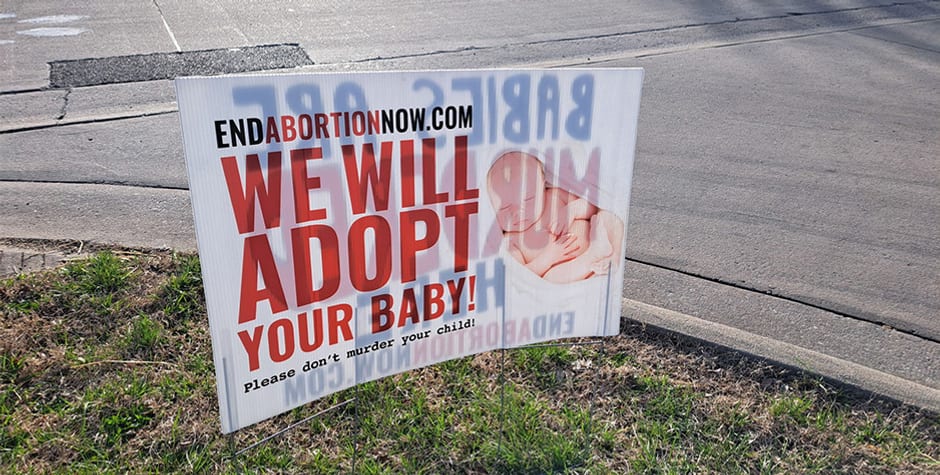ACLJ Files Motion for Preliminary Injunction To Block Carbondale’s Unconstitutional Ordinance From Shutting Down Our Client’s Pro-Life Signs
Listen tothis article
In a bold move to protect the First Amendment rights of our client, we have just asked a federal court to prevent the city of Carbondale, Illinois, from enforcing an unconstitutionally vague ordinance that restricted our client Brandon’s speech. If you’ve been following Brandon’s story, you’ll recall that he is a pro-life missionary and founder of a sidewalk counseling ministry who found himself entangled in the bureaucratic web of Carbondale’s unconstitutionally vague ordinance while peacefully advocating for life with small pro-life signs near a local abortion clinic.
On April 16, Brandon was exercising his right to free speech by displaying signs that read “Free baby supplies” and “Please don’t murder your unborn baby.” These signs, placed in a grassy area open to the public near the abortion clinic, should have been protected under the First Amendment. Yet Carbondale Community Development Manager John Lenzini, at the bidding of city attorney Jamie Snyder, tried to cite Brandon by saying the signs were either “commercial” or were not a First Amendment “demonstration”; and Mr. Snyder, through Mr. Lenzini, declared the signs violated the ordinance on permitted temporary signs.
After our client attempted to comply with the express demands of the city officials by swapping out those signs for others that purely expressed pro-life messages, Mr. Lenzini still insisted they were in violation, claiming he had consulted with Mr. Snyder, and both remained adamant that Brandon’s speech was not protected speech. Astonishingly, even when presented with the ordinance’s language – which specifically exempts demonstrations from certain restrictions – and the fact that Brandon has a constitutionally protected right to engage in demonstrations, Mr. Lenzini denied Brandon’s right to free speech, simply stating, “No, you don’t.” It’s clear that these city officials care more about arbitrarily enforcing a vague sign ordinance than protecting the speech of American citizens.
Then, Carbondale Community Development Manager Lenzini escalated the situation and called the police. Police officers arrived and gave Brandon yet another interpretation of the ordinance. They said that Brandon could place the signs further than 20 feet from the road. Mr. Lenzini then interrupted the police and said that no signs could be placed on public property, but the demonstrators could hold the signs. The officers and Mr. Lenzini contradicted themselves. This contradiction highlighted a core issue: The ordinance is hopelessly vague. It fails to clearly define what is permitted, leaving its enforcement to the whims of city officials. This type of arbitrary application is not only unconstitutional but strikes at the heart of our First Amendment freedoms.
The very next day, our client went down to the municipal building and requested a permit to display signs, noting a provision in the ordinance for 501(c) organizations to obtain such a permit. His attempt was met with outright denial. Mr. Lenzini stated flatly that “you can only get a sign permit if you own the property,” despite the ordinance explicitly stating otherwise. This refusal is not just bureaucratic incompetence; it is viewpoint discrimination. Brandon’s pro-life message was singled out and suppressed, despite clear legal protections.
We have taken decisive action by filing for a preliminary injunction, along with a declaration from our client and accompanying exhibits. Importantly, the exhibits include photos from other signs that the city did not take down despite being in violation of the way Mr. Lenzini and Mr. Snyder attempted to enforce the ordinance against our client. This further shows how arbitrarily this statute is being enforced and that our client was, in fact, targeted for his pro-life speech. Our argument is clear: The city of Carbondale’s ordinance is unconstitutionally vague and discriminatorily enforced. It chills free speech, allows for arbitrary enforcement, and silences voices the city disagrees with – which in this case are those protecting innocent lives.
Why This Matters
The First Amendment prohibits laws that are vague and infringe on the right to free speech. The Supreme Court has held that a statute is “vague” when an ordinary citizen cannot understand what the law means and could have differing opinions on how the law should be applied. Essentially, if five people can give you five different meanings of what following that law looks like, it’s unconstitutionally vague. And that’s exactly what happened here. This is important because, as courts have noted, the law must “give people fair notice of what conduct is prohibited” so that people can follow the law. Without this benchmark requiring a statute to be reasonably understood by ordinary, reasonable citizens, government corruption – like we see here with Brandon’s case in Carbondale – would run amok, and governments would be able to arbitrarily enforce unconstitutional laws without a citizen having any idea what appropriately following the law looks like. This is a direct due process violation.
When government officials are permitted to arbitrarily enforce vague ordinances, free speech is at risk for everyone. The First Amendment does not permit local governments to pick and choose who gets to speak based on their viewpoints. Today, it’s Brandon’s pro-life advocacy; tomorrow, it could be any message the city finds inconvenient.
We are committed to defending Brandon’s rights and setting a precedent that vague and discriminatory laws will not stand. Stay connected with us for updates as we continue this critical fight to protect free speech and hold Carbondale accountable.
